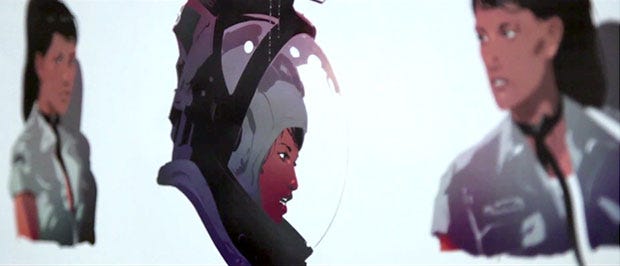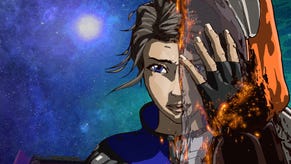Alien: Isolation Devs Talk Xenos, Horror & the Ripley Dynasty
Unclouded by conscience, remorse, or delusions of morality
We sent Brendan to Creative Assembly to meet the star xenomorph of their new first-person survival horror, Alien: Isolation. While he was able to file yesterday's extensive hands-on report from the field, he has not been seen since. But a crack team of RPS androids infiltrated the facility and recovered a sticky voice recorder with his name on it, containing an interview with Al Hope, Creative Lead on the project and Jon McKellan, Lead UI Art & Design. Here is a transcript of that interview, in which they discuss why this is true to Alien, who else players may encounter, how they think they can keep a single foe scary throughout, hiding in lockers for ten minutes and how and why Ripley's daughter is the protagonist.
RPS: Hi guys. That Alien: Isolation is being billed as a survival horror game is going to be important for fans, considering the latest game Colonial Marines, which went in the complete opposite direction. Is that something you have to think about?
Hope: Absolutely, I mean I’ve been thinking about this game for a very long time, having read the Alan Dean Foster novelisation as a kid before I even saw the film and thinking, “wow, this character’s cool” and then seeing the film and thinking, “wow, this is an amazing visual world.” I mean, we’ve been working on this for over three and a half years. I think for us from the outset the goal was always really clear. The vision was crystal clear, so we just stuck to that. That hasn’t changed over the course of development, so we’re kind of blinkered in that respect but... we’re doing our own thing, we’re taking the franchise in a completely different direction.
RPS: When you say that the Alien is “low frequency” and that it won’t show up too often, what other kinds of threats or challenges will be there for the player?
Hope: So the game is very much about you surviving and your journey through the [station], it’s about that whole space. It’s not just about you and the Alien. The demo today was very much about giving you a very small glimpse of what it’s like. Which was basically a test for us, you know – what’s it like to put a player in a space with Ridley Scott’s original Alien and a motion tracker? What is that like? I mean, one of the first things, before we had anything on the screen, I’d be talking to guys in the studio, going... “Okay, we’re going to release Ridley Scott’s Alien in the studio. What you gonna do?” It was a cool jumping off point because people would be saying, “Okay well I’m gonna crouch under my desk – make sure he can’t see me!” Cool. Then what are you gonna do? It was kind of a nice concept, you know... But to go back to your question, it’s very much about surviving against all the obstacles that the player is up against. The world itself is very dangerous and it’s physically dangerous, the world is kind of a puzzle in some respects. There is a small group of inhabitants on that station and they’re in a similar situation to you and how they react to you varies – sometimes positive, sometimes negative. There’s a large number of combinations of things that the player needs to be thinking about all the time to survive and it’s very much about surviving.
RPS: So it is almost going to be that BioShock feel where you have entered a world that has gone a bit wrong? And where there are other people who also have their own interests at heart?
Hope: I guess so, yeah.
McKellan: I think everyone on the station is trying to survive in whatever way they can, so there is a population on that station that is going down rapidly.
Hope: I suppose the difference for us would be that you arrive during, rather than afterwards.
McKellan: Yeah, this isn’t turning up ten years later to say, “what happened here?” You’ve turned up right in the middle of it so everything has gone a bit chaotic that way.
RPS: Do you find there’s a lot of expectation to create the Alien game that everyone has kind of wanted for a good while?
Hope: Yeah, the starting point was absolutely, “let’s make the Alien game we want to play”. There was this massive untapped potential... In terms of expectation, I dunno, I think we have high ambitions for this and putting a lot into it. This is just the start for us. We were saying earlier that we’re kind of bursting to talk about it. This is the start of the conversation with the fans and with the audience, so yeah, it feels like we’re going into uncharted territory but because we’ve always been quite clear about what we want to achieve, we’re adamant that we’re going to deliver on that promise. I guess the expectation comes from ourselves. If you’re making the game you want to play you’re going to do everything you can to deliver that.
McKellan: I mean, we do read online forum posts and blog posts and Twitter feeds and try and stay as connected to that stuff as possible and we’re always seeing the same posts come up again and again, which is: “why can’t you give us an Alien game that’s survival horror where you only face one Alien?” This kind of thing. Yeah, that’s what we’re doing... Obviously, we just hope we can do the best work we can but I think we’re on the right track in terms of meeting this expectation.
RPS: How do you guys deal with the problem from a design perspective, which some people had with Amnesia where they would be terrified for the first three hours of the game, while they were surviving, then once something had killed them and it just restarted them three minutes back, they were less scared. It almost became less of a threat?
Hope: Yeah, I think... we’ve been working on this game for a while and we play it every day and we do often try to get the atmosphere right, so we play it in the dark. Having said that, we will play the game and it will make us jump and it’ll make us shout. We had a meeting in this room three weeks ago where the Lead Level Designer and the Lead Artist jumped and actually grabbed each other for some kind of comfort they were so shocked... And I suppose that’s what we’re trying to achieve. You know, we’ll die. We’re the experts, we know everything about how this thing we’ve created, from its AI to how he should be thinking through to the world that they – it – exists in.
[I have only just noticed this telling slip of the tongue. From ‘they’ to ‘it’? Interesting...]
Hope: So we know everything there is to know about creating this creature but he’ll still catch us out, he’ll still make us tense, he’ll still get our hearts racing when we’re playing it because it’s unpredictable and we don’t know what he’s going to do. He gets the jump on us. You know, so in the demo you saw today... it had a lot of restraints and we were throwing you in at the deep end. But there are more valves we could have opened up, he does navigate the world using the same space that you can walk around. But he’s also able to go up into the ceiling. I think the earlier pings you heard on your motion tracker was him up above you. So he’s able to get around very, very rapidly. You’re never one hundred percent safe.
McKellan: The thing is we’ve built such a complex AI, a very intelligent-looking creature, when it does think and does use its senses, it can still surprise you. It still surprises us so we know we’re doing something right when that happens... I think the dynamic nature of it – that it is different each time you play – that it feels like there is something that keeps you scared, keeps you tense.
Hope: It shouldn’t really work on us anymore. We should be kind of immune to it... Being completely internal for such a long time, it’s great to have, like, yourself come and play it because every time someone plays it we learn a little bit more about how people react and how people behave in that situation. As we go into our final phase of development we can take advantage of that and keep tuning.
RPS: How did I compare with other players? Did other people play through it faster or...?
McKellan: I think that was really interesting, when we had the groups in they would all press start at the same time but ten minutes in they would all be in radically different places doing completely different things and it was just really interesting to see how people reacted to everything. The ping on your motion tracker where there is some thing somewhere. Some people would immediately stop what they were doing and just stand with the tracker for three minutes. Whereas other people would almost not notice and just keep going until they saw something with their own eyes. It was really interesting to see these wide ranges of play and that’s one of the challenges we’ve got is to make sure that it’s within two reasonable boundaries...
Stefan, the Sega PR: One guy was in a locker for at least ten minutes. And kept going back.
RPS: That’s what I kept doing – I kept going back to underneath the table because I felt like, ‘He’s gotta come in here at some point. I’m just going to go back and sit under this dinner table until he comes in.’
Hope: That goes back to the original question: what are you gonna do? You know, ‘I think I’m kind of safe for the moment but I need to move.’ For me it’s this kind of constant rolling checklist, this information walkway: Is he on the tracker? Yes or no? Is he coming towards me or [not]? In the wider game – you collected some stuff today – in the wider game you’ll be able to make use of that in various means. It’ll be: “Okay, what have I got? Can I do anything with that? Is that useful to me right now? Do I use it now, or do I use it later?” If you’re out in the open it’s: “Okay, what’s my immediate threat? What’s my immediate safe haven? Do I move or do I stay?”
RPS: Can you give me any clues as to what sort of things you’ll make to help you out? And will they be a one-use item that you would make or...?
Hope: Like I said, we’re not really talking about it today [smiling] but I think when people have given us feedback, some of the things they intuitively liked we are probably going to support. Which, uh, doesn’t really answer your question...
RPS: What I instinctively wanted was just, like, a pipe. Just to feel like I could keep it away from me.
Hope: Actually, in the demo you did have a sort of wrench, hammer... tool.
RPS: I did not even know that I had that...
Hope: Sometimes that makes people feel a bit better that they have something.
RPS: But I guess it makes no difference really?
McKelllan: That’s the interesting thing. We’ve had that in a few playthroughs... And in other games, not just the Alien games but in general, when you come across the big bad guy the first thing you want to do is to bring out a weapon and shoot it. Like the Big Daddy in BioShock or whatever, you want to find out how you’re going to take that down. But in all the playthroughs of Alien it’s always been: people come into a room and the alien is there and they just want to back away. It’s not about overcoming... It’s funny when we put lockers in the other day, we had a guy who was playing it and he was like, “Ah, I’m going to use a locker, it’s going to feel safe”. He was being hunted by the alien and climbed into a locker and closed the door and then went: “Shit, now I can’t see him.” That safe haven wasn’t safe anymore because now he had no idea where it was and he was just petrified because he’d gained some security but lost his senses.
Hope: Absolutely. That was one of the key learnings we discovered really early on. With one of the first prototypes the challenge was: okay, this game needs to be equally scary and thrilling. If we just put you in a room with an alien, with a simple A to B objective... It was just really fascinating to watch that because people would be scared when they could see the alien because it meant that they were in immediate danger, and could actually see how close they were to danger. They seemed to be equally scared when it went up into the vent because... when is it going to appear? And where is it going to appear? I mean, you can go to the locker. Right, excellent. But you’re not exactly one hundred percent safe there if you’re discovered.
McKellan: Right, yeah, there’s a sense of safety but you’ve also locked yourself in a box... It’s that weird paradox where you’re safer than being stood in a room on your own but you got even less options if it does come into the room... Rather than thinking “what do I shoot it with?” you’re thinking, “God, did I do the right thing?” and as soon as it puts its head in the door you’re going, “shit shit shit shit.”
Hope: That’s a necessary thing for us, that there’s some kind of cost associated with every action. Even the motion tracker, you know, you pull it up but it blurs the view in the distance, so you have to switch. So, do you want to be able to see the motion tracker but lose some visibility? Or do you want to switch it around and look at the distance but with a blurred motion tracker?
RPS: Yeah, Doom 3 almost had that idea, where you could have your flashlight out or your gun but you can never have both at once. Are there any plans to have any kind of multiplayer at all?
Hope: No. It’s very much about a single player experience. We did think about it, it’s not like we never considered it – and we had some pretty neat ideas around that. But for us the focus always was that single player experience. And I think because you have this dynamic alien and it’s about the player’s choices while they play it, it does mean that you can go back and try different stuff out. So I think there is a lot of scope to have players go back and do things differently.
McKellan: I think that as soon as you up the amount of humans then you’re no longer as ‘outnumbered’. You know, if you had two or three humans facing up against one alien it’s a completely different experience where you’re working together to overcome it rather than just trying to survive. It just felt better to leave it single player.
Hope: It’s interesting that you talk about Amnesia as an influence. You know, we’re not as blinkered – blinkered is probably a negative word – but, as focused as we are on what we’re trying to do, we do find inspiration from other games or other films. Like Amnesia is a great example – it’s a wonderful game – but there’s something like Limbo where there’s this oppressive atmosphere and the sound and there’s almost an anti-fanfare around death, the kind of cold death, there’s not even any sound it’s just – [claps] – cut to black. Something like Thief, you know, being underpowered and these guards walking around and facing into a corner of the wall just praying, “I hope they didn’t see me”. It’s not about throwing things in your face, it’s just the pressure you’ve got on yourself. Or in Condemned, the people coming out of the dark with a pipe out of nowhere, you know, the brutality...
McKellan: The way they would kind of yell abuse at you and then run away back into the darkness and you don’t know when they’re coming back.
Hope: Yeah, fantastic.
RPS: Imagine an alien doing that.
Hope: I suppose survival horror has kind of found its place. Even in Minecraft, like, your first night in Minecraft is terrifying. Especially if you come to the experience completely dry and you don’t know really what you’re doing and something’s banging on the door and you’re thinking: “SHIT.”
RPS: If you even have a door.
Hope: Yeah, if you have a door. Or the first time a creeper blows a hole in your wall. It’s good stuff.
McKellan: The thing is I think survival horror has over the years drifted toward action, with Gears of War being an inspiration, like Resident Evil has got more and more action.
RPS: Which is stupid because the less vulnerable you are the less scared you are.
McKellan: Exactly. Give the player lots of weapons and they’re not scared anymore. So I think it’s quite interesting for us to veer back towards the classics and so something that is just about surviving, something a bit refreshing, weirdly. It’s what the genre was all about ten or fifteen years ago – the original Silent Hills – and now it’s all about shooting thousands of zombies or whatever. If we can bring that back that sense of being scared but, like Al says, the balance of being thrilled and scared and making sure you’re not just being pile-drived into the ground with fear for X hours. You’ve got to have those breaks, those bits of relief. You know, when everyone was playing the demo there’s always that sigh of relief when they got to the airlock. That is really important... It’s those little moments that are key to keeping the thrill going, the rollercoaster going. So it’s not just an oppressive scare factory where you’re being constantly hunted, you’ve got to have some breaks.
Hope: We talk about having small victories and I think horror is about the tiny victories that make you feel like it’s not over but you might have changed the odds ever-so-slightly, and if I keep doing this I might win, or might succeed, might survive. I think it’s important to keep the player... to keep signs of having hope. Keep them thinking of making it...
[A brief silence follows]
Hope: You probably said “fuck” more than – just thinking about your earlier question – you probably said “fuck” a little bit more than average. “Fuck” and “oh fuck”.
RPS: Yes, that sounds like me.
McKellan: It was good having the European journalists in because I could recognise them swearing in their own languages. I was like, “I can’t speak Italian but I know what that word means.”
RPS: Was it Dan Abnett [the writer] who came up with the idea of having Amanda Ripley as the protagonist?
Hope: No, I think that was something that we wanted to do it – that was something we went to him with and said, “this is what we’d like to do”. I mean, for us, we wanted to have that connection to the first film. I wanted to make a game that took advantage of all that good stuff, that feel and look and aesthetic. So it was always going to be historically placed very close to the first film. And it just kind of felt like there was this window between Alien and Aliens which is really unknown. Just going back to the same question – the Nostromo has gone missing. Who’s going to care? Who’s going to go looking for it? That led us to Amanda... she’s going to care. She’s going to want to know the answers and she has an emotional connection to the first film.
McKellan: It’s a character who’s not been explored. The only information we get from the second film is that she died in her sixties, or so [Ripley] is told. That’s literally all we know about her. Yet she had to have wondered what happened.
RPS: Removes some of the game’s peril if you know that she is going to live into her sixties. Unless!
Hope: Aha! But this is the good thing about Weyland-Yutani, right? The person that tells Amanda Ripley about her daughter proves that he’s not a particularly trustworthy character and so, as to what Weyland-Yutani, or Burke, knows – you can’t be a hundred percent sure. It’s not particularly solid ground... That’s the thing, if he wants her to go on that trip with the marines [in Aliens] he has to prove that she’s got nothing else to live for. So: dig up photo of old woman... So, there is this amazing character, who shares a connection to the first film, and we’re sharing the values of the first film and it felt like it was a story that needed to be told. Amanda’s story, you know, what did she do?
RPS: The audio seems to be very important. I know you managed to get samples from the first film and stuff. Is that something you set out to do from the start or did you guys just take a chance that paid off?
Hope: No, I think, like you’ve seen, we really like going back to the well of the first production and I think anything that can relate this game a little bit more to that space is good for us. And for us to be able to understand how they put it together... When we did the recording, one of the guys who’d worked on the original motion picture recording remembered that to get one of the sounds in the score they had to use a tennis ball on the underside of a piano. And that’s the kind of information which is on the verge of being lost. The chances of people remembering that stuff... Again, it’s not a ‘back-of-the-box’ feature but it’s one of those small, incremental, one percent things we can do to make it feel a little bit more authentic.
RPS: Sound effects are very important for horror, for example Dead Space would not have been half as scary to me without its sound design. What kind of things have you guys done to make sure that it has that feeling?
McKellan: I don’t know, I think in terms of those old games like Silent Hill 2, which was amazing at sound design and creating a space and giving a space life – I think it’s hugely important in our game to do that stuff and it’s just about layering that stuff up. It’s quite an iterative process because a majority of the sound systems in the game are dynamic as well and react off what you’re doing and what the alien is doing and where you are. So it’s not like we’re playing a bit of music at the start and letting it run. It’s all about when to be quiet, when to be loud. And that’s been a really iterative thing where we’ve kind of passed sections of the game over and over again to try and get the right balance of intensity and sparseness.
RPS: Fellas, thanks for your time.























